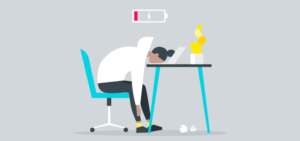
College has always been a stressful place for students, and since the COVID-19 pandemic began 30 months ago mental health problems like burnout have only gotten worse.
According to Maristcircle.com, an Ohio State University survey found that the number of students who reported feelings of burnout increased from 31% in 2020 to 71% in 2021. They also found that college students learning to adapt to a new environment and learning how to take care of themselves while juggling studies and extracurricular activities are two common causes of mental health problems.
As FAMU students approach the middle of the semester, it can be very stressful preparing for midterms and keeping up with an ever-present workload. However, there are many different ways to help prevent this stress and stay on track.
The “Three Good Things” guideline, which involves reflecting on three positive events from the day, no matter how minor or significant they were, is advised by the American Psychological Association. This aids in maintaining self-awareness and has been shown to reduce anxiety and depression in those who practice it.
Being compassionate to yourself is another approach to dealing with academic burnout. It can be tempting to focus on the bad things that happen to us, but we must keep in mind that this is part of life and that we are only human.
Never hesitate to seek assistance if you need it. Students at Florida A&M University have access to a wealth of resources that they should make use of. Tutors are offered on campus in learning centers if you’re struggling in your classes. You just need to choose whatever learning center you want to assist you with your work and arrange an appointment. There is a writing resource center, a math center, a science center, a Gaither center and a learning lounge in the library.
Find something to do that will take your mind off the stress you’re going through to help cure your stress. A great activity to help is any form of exercise. According to Health.harvard.edu, “Behavioral factors also contribute to the emotional benefits of exercise. As your waistline shrinks and your strength and stamina increase, your self-image will improve. You’ll earn a sense of mastery and control, of pride and self-confidence. Your renewed vigor and energy will help you succeed in many tasks, and the discipline of regular exercise will help you achieve other important lifestyle goals.
Academic burnout can be treated in a variety of ways but getting the right treatment when you need it is crucial.” FAMU offers free counseling if you ever need to talk to someone about anything. You can schedule up to 12 sessions per semester, and you can choose between attending group or one-on-one therapy sessions.